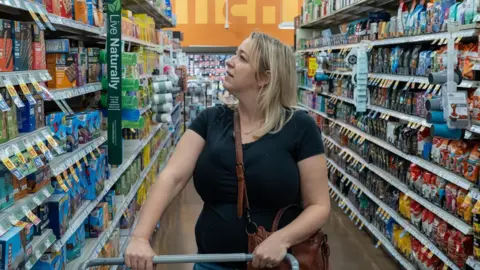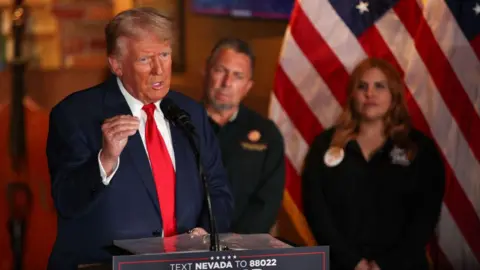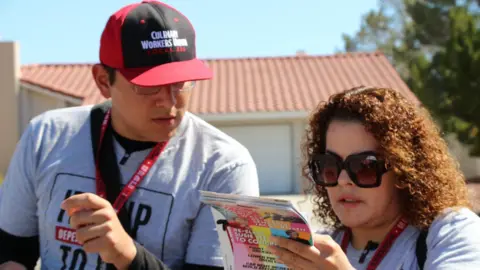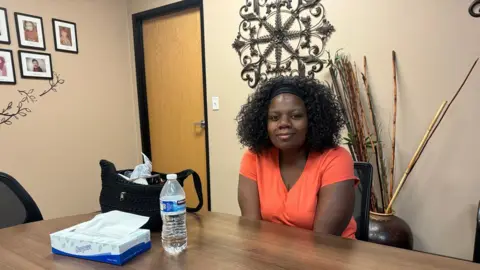 BBC News/Anthony Paculan
BBC News/Anthony PaculanWhen the sun sets over Las Vegas, Nicole Williams gets to work, serving drinks from behind the bar of an opulent hotel on the city’s infamous strip.
But life for Ms Williams, 45, and other service-industry workers who form the quiet backbone of Vegas’s booming economy, is far from luxurious.
“When you’re shopping for a big family like mine, it’s rough out here,” she told the BBC while shopping for groceries and taking children to appointments across town.
The mother of seven children, aged 10 months to 16, said she often fears buckling under the weight of the economy.
From sky-high prices on groceries to petrol, Ms Williams said she has had to cut back on vacations as well as on football and gymnastics lessons for her kids that would force her to stretch an already strained household budget.
“We haven’t been able to do the things we want to do,” she said. “I want a future for my kids.”
She is not alone. In dozens of interviews with Las Vegans who work in vital local industries from construction and casinos to restaurants and bars, low-wage workers from across the political spectrum told the BBC that kitchen-table issues – especially unaffordable housing and costly childcare – are what will determine how they vote on 5 November.
It’s these voters that Donald Trump and Vice-President Kamala Harris hope to win over in Nevada, a hotly contested battleground state in which the two remain neck-and-neck in the polls.
To court low-wage workers, Harris and Trump have laid out starkly different economic visions, including competing anti-poverty policies that could help shape the financial security of millions of families.
But victory in unpredictable Nevada – one of the key states which will determine who becomes the next president – will be won by just a tiny fraction of undecided voters there, political insiders say.
Data shows that about a third of the state’s voters consider themselves independent, with an August New York Times/Siena poll of likely voters showing that a slight majority of independents lean Republican (43%) compared to those who lean Democrat (39%).
“Nevada is not a blue state,” said Ted Pappageorge, the Secretary-Treasurer of Culinary Union Local 226, referring to the traditional colour of the Democratic Party (the Republicans are red).
The politically powerful group has endorsed Harris.
“We’re barely purple. If the election happened right now, Trump wins, we think,” he added.
 Getty Images
Getty Images‘Everything was cheaper’
Despite booming business, Nevada’s unemployment rate was the highest in the nation at 5.6% in September. In Las Vegas, home to three quarters of the population, the figure stood even higher at 5.9%.
The state was also hit particularly hard by the pandemic, when unemployment rose to around 30% – which State Democratic Chair Danielle Monroe-Moreno described as a sign that “when the country gets a cold, Nevada gets the flu”.
As the US economy has rebounded, however, Trump and Harris have pursued contrasting economic policies to alleviate some of the burdens on low-income workers. Harris vowed to expand many of the Covid-era policies President Joe Biden pursued when he took office in 2021, including healthcare and housing subsidies and reviving the enhanced $6,000 child care tax credit.
Trump has pushed the idea of renewing his 2017 tax cuts – which are set to expire next year – while imposing sweeping tariffs on foreign imports which he says will reduce poverty and boost economic growth.
“Five dollars isn’t $5 anymore, and $100 barely gets you any groceries,” said Fermin Gonzalez, an unemployed, Mexico-born former restaurant worker living in Las Vegas.
At 60 he fears he will have difficulty finding work again. “We used to be able to make money here. People are dissatisfied.”
To try to persuade voters who feel the same, both parties are relying on door-to-door campaigning efforts by allied get-out-the-vote groups.
The Culinary Union – the state’s largest union which represents a variety of occupations in hotels and the food service industry – has dozens of teams knocking on doors to drum up support for Harris and other Democratic candidates.
On a September afternoon, two members walked for hours in 40C (104F) heat in a modest North Las Vegas neighbourhood near the edge of town, where the city gives way to desert and craggy hills.
“Things are very hard. We feel it a lot,” said Olga Mexia, a Mexican immigrant and mother of five who works as a housekeeper at the Signature hotel on the strip.
“We’re paid so much less for everything. [Four years ago,] rent was less, groceries were less.”
“I had to have two jobs at one point to make it work. I’m campaigning for my family. Harris at least has a real plan,” Ms Mexia added, taking shelter from the sun under a tree while her teammate knocked on a door. “That’s the sort of thing people want to talk about.”

The battle over ‘tax on tips’
One economic proposal where both candidates overlap is ending taxes on tips – a concept that has found a receptive audience among Nevada’s service workers, more than half of whom are Latino.
More broadly, Latinos represent about 30% of the state’s population, along with 19% of its business owners. Given how close the election is likely to be in the state – and nationally – both parties increasingly see the mobilisation of Latino voters as key to their victory.
Ms Williams, the bartender – who says she’s “100% voting Trump” – makes $20 per hour but said tips make up her main income, bringing in as much as $250 on a good night. But even as she uses coupons, bargain hunts and budgets a weekly menu plan, it’s not enough.
Trump was the first to propose the idea at a Las Vegas rally in June. In August, he again highlighted the plan during a stop at a Mexican-Italian fusion restaurant located on the city’s west side.
The restaurant is owned by Javier Barajas, a Mexican immigrant who first crossed into the US illegally in 1978 and found himself in Las Vegas, almost by chance, after being separated from his travel companions.
Once a dishwasher, Mr Barajas is now a fixture of the community and owns a string of popular Mexican restaurants that employ an overwhelmingly Latino workforce of more than 500.
“My waiters make $12 – the minimum wage. I’m not saying that like it’s a lot. It’s hard. Every time they go to the gas station they end up spending $100,” he told the BBC, switching back and forth between English and Spanish in a corner of his restaurant.
Mr Barajas, an outspoken Trump supporter, says he believes an end to tax on tips would vastly help his workers with day-to-day expenses, while at the same time having minimal impact on him as an owner.
“That idea is interesting to people like them,” he said of his workers. “I completely understand why.”
Harris endorsed the no-tax-on-tips policy at her own Las Vegas rally in August, although in her case it’s paired with raising the federal minimum wage to $15.
Experts have cautioned that cutting taxes on tips may have minimal benefit on the US economy as a whole, and the Tax Foundation has estimated that any change could cost at least $107bn. Any change would also have to be passed by Congress.

‘I’m drowning’
For many working-class Las Vegans, inflation and rent pressure are compounded by childcare concerns.
Childcare in Nevada is more expensive than anywhere else in the US, with the average family spending nearly $26,000 on it a year – more than a third of their annual average income, according to a July report from the state’s Office of Workforce Innovation.
Harris has campaigned on a promise that child care costs would be capped at 7% of family income, along with a $6,000 child tax credit. Trump has so far offered no specific plans, although his running-mate Senator JD Vance has proposed raising the child tax credit to $5,000 from its current $2,000. Vance skipped a vote in August on a failed Senate bill that would have expanded the child tax credit for low-income families.
Among those feeling the pinch is Dominic Richmond, a 50-year-old single grandmother who cares for four young children with special needs – aged one, four, six and nine – as well as a mother with dementia who lives nearby.
Ms Richards lives in a small two-bedroom apartment that costs her $1,600 per month. While she works part-time as a realtor – a job she said “leaves no money” – and 16-hours-a-week at an airline, she said that the combined costs of taking care of the children, rent and high prices have left her in dire straits.
“When you put it all together, it’s like a hurricane coming at you,” she said, wiping away tears at the offices of Children’s Cabinet, a local non-profit. “It’s just me doing all this. You can’t function in society on ‘just me’.”
Once a week, Ms Richards heads to a crowded food bank, which she says are now mostly distributing self-heating military-style ration packs – which usually include a small main course, crackers or cheese, dessert and a powdered drink – to help feed her family. She grudgingly asks acquaintances for help – most often with no success.
Ms Richards says she’s “not a political person” – she just wants a candidate who would help families like hers.
“I’m just hoping that when November gets here, that we will see somebody start to help where the help is needed,” she said. “By the end of this year, I’m probably going to be homeless. I’ve exhausted everything that I can.”



